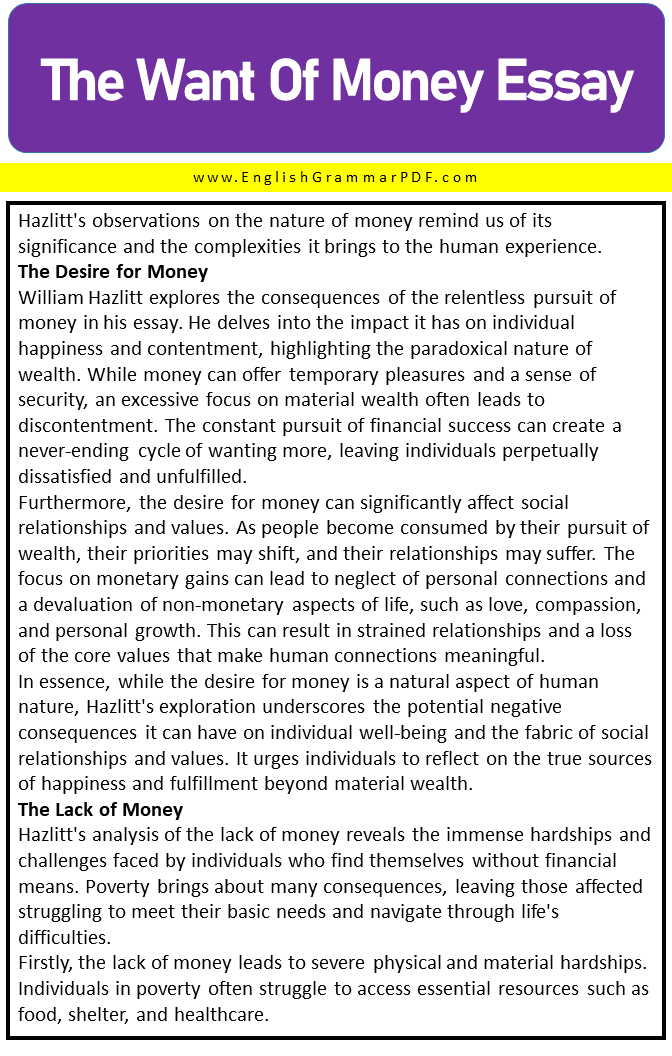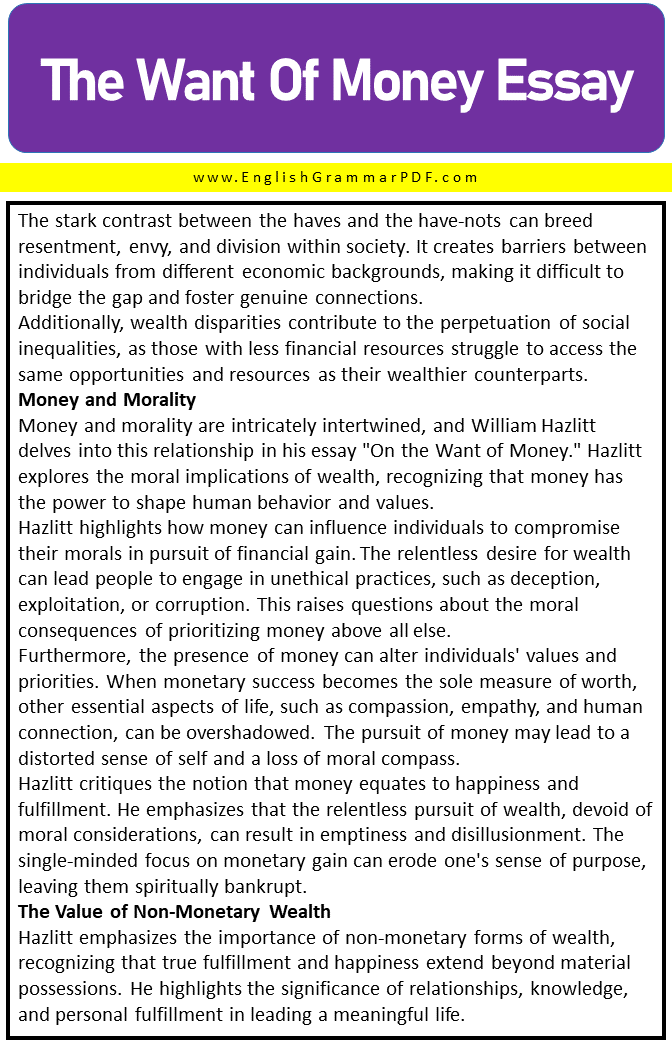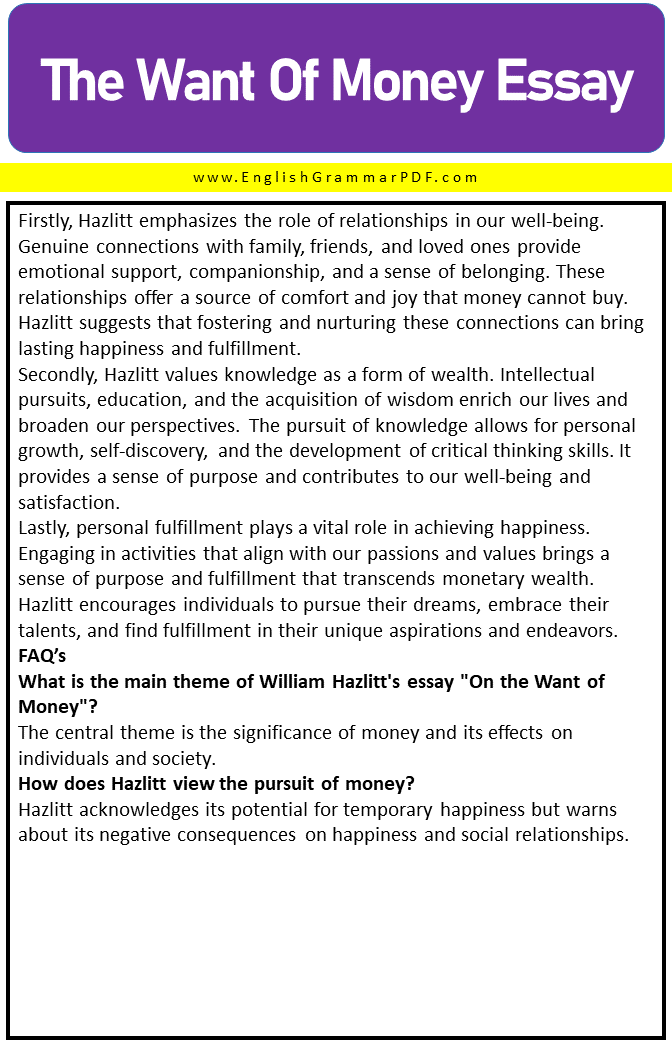The Want Of Money Essay
Outline of Essay:
- Introduction
- The Nature of Money
- The Desire for Money
- The Lack of Money
- Money and Social Status
- Money and Morality
- The Value of Non-Monetary Wealth
Introduction
William Hazlitt, a renowned English essayist, and critic, explores the significance of money and its effects on individuals and society in his essay “On the Want of Money.” This essay will provide a brief overview of Hazlitt and his work, and present a thesis statement that highlights the exploration of money’s impact. The essay aims to delve into the nature of money, the desire for wealth, the consequences of lacking money, the association of money with social status, the illusion of wealth, the moral implications of wealth, the value of non-monetary wealth, and conclude with reflections on the enduring relevance of Hazlitt’s observations.
The Nature of Money
Hazlitt observes the immense power and influence that money holds over individuals and society. He highlights how money becomes a symbol of success and achievement. It grants access to opportunities, resources, and a higher social status. Those who possess wealth often enjoy a greater level of freedom, security, and comfort. Money can open doors, provide a sense of empowerment, and shape the lives of individuals in profound ways.
Hazlitt also points out the potential dangers associated with the power of money. The pursuit of wealth can lead to a relentless focus on material possessions and financial gain, overshadowing other important aspects of life. It can distort values, strain social relationships, and create a sense of emptiness and dissatisfaction. Hazlitt’s observations on the nature of money remind us of its significance and the complexities it brings to the human experience.
The Desire for Money
William Hazlitt explores the consequences of the relentless pursuit of money in his essay. He delves into the impact it has on individual happiness and contentment, highlighting the paradoxical nature of wealth. While money can offer temporary pleasures and a sense of security, an excessive focus on material wealth often leads to discontentment. The constant pursuit of financial success can create a never-ending cycle of wanting more, leaving individuals perpetually dissatisfied and unfulfilled.
Furthermore, the desire for money can significantly affect social relationships and values. As people become consumed by their pursuit of wealth, their priorities may shift, and their relationships may suffer. The focus on monetary gains can lead to neglect of personal connections and a devaluation of non-monetary aspects of life, such as love, compassion, and personal growth. This can result in strained relationships and a loss of the core values that make human connections meaningful.
In essence, while the desire for money is a natural aspect of human nature, Hazlitt’s exploration underscores the potential negative consequences it can have on individual well-being and the fabric of social relationships and values. It urges individuals to reflect on the true sources of happiness and fulfillment beyond material wealth.
The Lack of Money
Hazlitt’s analysis of the lack of money reveals the immense hardships and challenges faced by individuals who find themselves without financial means. Poverty brings about many consequences, leaving those affected struggling to meet their basic needs and navigate through life’s difficulties.
Firstly, the lack of money leads to severe physical and material hardships. Individuals in poverty often struggle to access essential resources such as food, shelter, and healthcare. They may endure hunger, homelessness, and inadequate living conditions. Necessities become elusive, and the absence of financial stability exacerbates their daily struggles.
Moreover, the consequences of poverty extend beyond the physical realm and impact individuals emotionally and psychologically. The constant stress and anxiety associated with financial insecurity take a toll on mental well-being. Fear of the future, feelings of hopelessness, and a constant sense of inadequacy can lead to depression and other mental health issues. The lack of money can also limit educational and career opportunities, perpetuating a cycle of poverty that affects future generations.
Hazlitt’s analysis highlights the profound and interconnected effects of poverty and the inability to meet basic needs. It underscores the urgency of addressing economic disparities and providing support systems to uplift those who lack financial resources. Understanding the emotional and psychological impacts of poverty is crucial to foster empathy and enacting meaningful change in society.
Money and Social Status
Money has long been associated with social status and power. The possession of wealth often grants individuals a higher position in society, providing them with opportunities, privileges, and a sense of prestige. The association of money with social status creates a perception that those who have more wealth are inherently more successful and influential.
Hazlitt critiques the social hierarchy based on wealth, questioning the fairness and legitimacy of a system that places such importance on material possessions. He highlights the arbitrary nature of this hierarchy and argues that true worth and character should be the basis for determining one’s social standing, rather than the size of their bank account.
Wealth disparities have a profound impact on social relationships and equality. The stark contrast between the haves and the have-nots can breed resentment, envy, and division within society. It creates barriers between individuals from different economic backgrounds, making it difficult to bridge the gap and foster genuine connections.
Additionally, wealth disparities contribute to the perpetuation of social inequalities, as those with less financial resources struggle to access the same opportunities and resources as their wealthier counterparts.
Money and Morality
Money and morality are intricately intertwined, and William Hazlitt delves into this relationship in his essay “On the Want of Money.” Hazlitt explores the moral implications of wealth, recognizing that money has the power to shape human behavior and values.
Hazlitt highlights how money can influence individuals to compromise their morals in pursuit of financial gain. The relentless desire for wealth can lead people to engage in unethical practices, such as deception, exploitation, or corruption. This raises questions about the moral consequences of prioritizing money above all else.
Furthermore, the presence of money can alter individuals’ values and priorities. When monetary success becomes the sole measure of worth, other essential aspects of life, such as compassion, empathy, and human connection, can be overshadowed. The pursuit of money may lead to a distorted sense of self and a loss of moral compass.
Hazlitt critiques the notion that money equates to happiness and fulfillment. He emphasizes that the relentless pursuit of wealth, devoid of moral considerations, can result in emptiness and disillusionment. The single-minded focus on monetary gain can erode one’s sense of purpose, leaving them spiritually bankrupt.
The Value of Non-Monetary Wealth
Hazlitt emphasizes the importance of non-monetary forms of wealth, recognizing that true fulfillment and happiness extend beyond material possessions. He highlights the significance of relationships, knowledge, and personal fulfillment in leading a meaningful life.
Firstly, Hazlitt emphasizes the role of relationships in our well-being. Genuine connections with family, friends, and loved ones provide emotional support, companionship, and a sense of belonging. These relationships offer a source of comfort and joy that money cannot buy. Hazlitt suggests that fostering and nurturing these connections can bring lasting happiness and fulfillment.
Secondly, Hazlitt values knowledge as a form of wealth. Intellectual pursuits, education, and the acquisition of wisdom enrich our lives and broaden our perspectives. The pursuit of knowledge allows for personal growth, self-discovery, and the development of critical thinking skills. It provides a sense of purpose and contributes to our well-being and satisfaction.
Lastly, personal fulfillment plays a vital role in achieving happiness. Engaging in activities that align with our passions and values brings a sense of purpose and fulfillment that transcends monetary wealth. Hazlitt encourages individuals to pursue their dreams, embrace their talents, and find fulfillment in their unique aspirations and endeavors.
FAQ’s
What is the main theme of William Hazlitt’s essay “On the Want of Money”?
The central theme is the significance of money and its effects on individuals and society.
How does Hazlitt view the pursuit of money?
Hazlitt acknowledges its potential for temporary happiness but warns about its negative consequences on happiness and social relationships.
Download the PDF of the Essay:
Explore More Essays:
Sexual Assault On College Campuses








